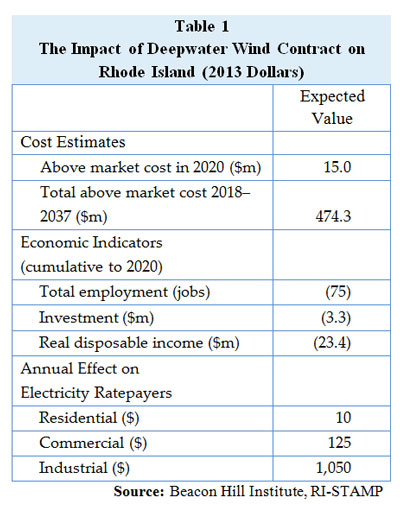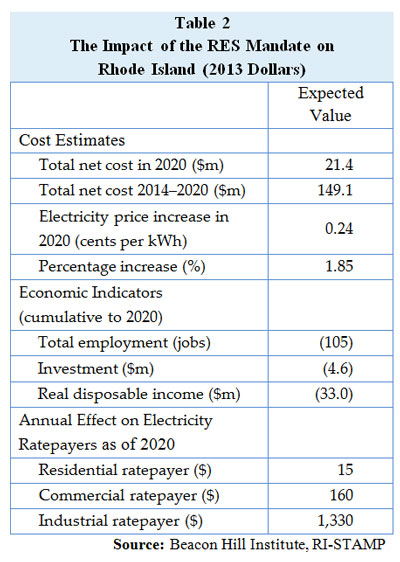The Economic Impact of the Above-Market Deepwater Contract
Published in Cooperation with the Beacon Hill Institute
Deepwater Impact
On December 13th, National Grid supplied new details about its contract with Deepwater Wind to purchase power produced by its proposed offshore wind farm. The contract calls for above-market rates, with the total cost estimated in the response along with other details.[1] Based on the underlying assumptions that the project will produce 125,000 MWh of electricity, requiring an annual capacity of 47.8%, the paper predicts a total of $474.3 million above market costs over the expected 20-year lifetime of the project.
We simulated the annual “Above Market Cost” predicted by National Grid in the Rhode Island STAMP® model as a percentage price increase on electricity to measure the dynamic effects on the state economy. The model provided estimates of the project’s impact on employment, wages, and income. Each estimate represents the change that would take place in the indicated variable against a “baseline” assumption of what it would have been in the absence of the Deepwater contract.
The agreement to pay above-market prices for the power produced by Deepwater will have negative economic effects on the state of Rhode Island. The touted job effect of a wind farm is true to a degree; some jobs will be created, such as those that maintain the turbines. But the model shows that the net effect is negative. Individuals and companies forced to pay more for electricity will consume less in other areas, leading to job losses across all sectors. There will be a net job loss of 75 jobs in 2020. Job losses and price increases, due to higher costs for commercial and industrial electricity consumers, will reduce real incomes as firms, households, and governments spend more of their budgets on electricity and less on other items.
In 2020, real disposable income will fall by an expected $23.4 million. Net investment will fall by $2.3 million, compared to a baseline of no Deepwater contract. In 2020, the “higher than market” electricity contract is expected to cost families $10 per year; commercial businesses $125 per year; and industrial businesses $1,050 per year.
Renewable Energy Standard Impact
Last month, Beacon Hill and the RI Center for Freedom & Prosperity released a similar analysis of Rhode Island’s Clean Energy Act Renewable Energy Standards (RES).2 These effects would be in addition to the Deepwater contract.
Rhode Island’s renewable energy standard mandate and Deepwater Wind cost $36.4 million annually by 2020.
[1] Docket 4371: National Grid’s Responses the Division’s Second Set of Post Hearing Data Requests. Rhode Island Public Utilities Commission. Available at: www.ripuc.org/eventsactions/docket/4371-NGrid-PHDR-DPU2_12-13-13.pdf (Accessed March 26, 2014.)




Leave a Reply
Want to join the discussion?Feel free to contribute!